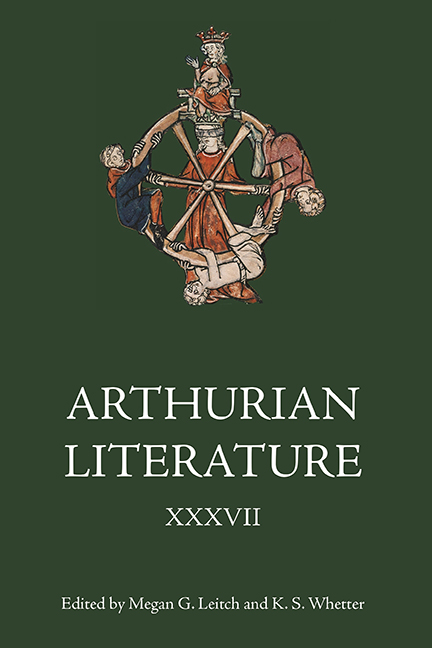Book contents
- Frontmatter
- Contents
- List of Charts and Tables
- Professor Fiona Tolhurst (1968–2021)
- General Editors’ Preface
- List of Contributors
- List of Abbreviations
- Introduction: The Tournament at Mapplemalleoré: Malory at 550
- 1 Malory and the Stock Phrase
- 2 The Artistry of Malory’s Mercantile Metaphors: Goods, Generosity, and the Source of ‘The Tale of Sir Gareth’
- 3 ‘A grete bourder and a passynge good knyght’: Sir Dinadan: ‘Gareth with a Twist’
- 4 Moonlight in the Nocturnal Typology of Malory’s Morte Darthur
- 5 ‘That shall nat ye know for me as at thys tyme’: Cognitive Narratology and Filling Malory’s Gaps
- 6 ‘On a tyme’: Action and Temporality in Malory’s ‘Sankgreal’
- 7 Hospitality in Malory
- 8 The Haunting of the Orkneys and Malory’s Arthurian Project
- 9 ‘I love nat to be constreyned to love’: Launcelot and Coerced Sex
- 10 Eradicating Victorian Backreading: Re-reading Malory’s Gwenyvere through Gaynour and Isode
- contents of previous volumes
7 - Hospitality in Malory
Published online by Cambridge University Press: 15 September 2022
- Frontmatter
- Contents
- List of Charts and Tables
- Professor Fiona Tolhurst (1968–2021)
- General Editors’ Preface
- List of Contributors
- List of Abbreviations
- Introduction: The Tournament at Mapplemalleoré: Malory at 550
- 1 Malory and the Stock Phrase
- 2 The Artistry of Malory’s Mercantile Metaphors: Goods, Generosity, and the Source of ‘The Tale of Sir Gareth’
- 3 ‘A grete bourder and a passynge good knyght’: Sir Dinadan: ‘Gareth with a Twist’
- 4 Moonlight in the Nocturnal Typology of Malory’s Morte Darthur
- 5 ‘That shall nat ye know for me as at thys tyme’: Cognitive Narratology and Filling Malory’s Gaps
- 6 ‘On a tyme’: Action and Temporality in Malory’s ‘Sankgreal’
- 7 Hospitality in Malory
- 8 The Haunting of the Orkneys and Malory’s Arthurian Project
- 9 ‘I love nat to be constreyned to love’: Launcelot and Coerced Sex
- 10 Eradicating Victorian Backreading: Re-reading Malory’s Gwenyvere through Gaynour and Isode
- contents of previous volumes
Summary
In the final books of the Morte Darthur Lancelot, gravely wounded, and Lavayne, Elaine of Ascolat's brother, find welcome and succour at the residence of a well-to-do hermit. This incident of hospitality and medical care incites direct authorial comment from Malory, in one of his always scornful remarks on the decline of standards ‘nowadays’. He writes:
For in thos dayes hit was nat the gyse as ys nowadayes; for there were none ermytis in tho dayes but that they had bene men of worship and of prouesse, and tho ermytes hylde grete householdis and refreysshed people that were in distresse.
The hospitality of hermits is a mainstay of the questing knight, throughout the Morte and indeed throughout the vast Arthurian archive, in spite of the oxymoronic qualities of the expression: the primary meaning of the word eremite is a solitary religious, while ‘hospitality’ inevitably implies welcome, good manners, conviviality and gregariousness. Hospitality is never solitary. Hermitry is also a well-known retirement project of knights errant, best expressed by Guy of Warwick; in fact, the hermit in this instance is a ‘knyght armyte’, Sir Bawdwyn of Bretayne. And while not a hermit precisely, Lancelot will also come to his final days as a religious recluse in the Morte. The notion of a solitary religious with a great household may even seem slightly ridiculous, insofar as it expresses a fantasy of keeping it all while giving it all up.
The hospitable hermit is a feature of the mysterious geography of the quest world with its landscape of forests and uninhabited lands; he is especially prominent in the more extremely devastated landscape of the Grail Quest. But the very structure of errancy, of knights riding forth into the forest of adventure, means that such a knight also throws himself into a world where hospitality will be necessary, whether from hermits or, more commonly, from the knights and castle keeps that dot this mythic geography.
The law of hospitality is implied and assumed throughout Arthurian romance. An ancient law, it includes: the duty to welcome the stranger, the obligation to give and receive courteously, and the suspension of hostility, on the part of both host and guest.
- Type
- Chapter
- Information
- Arthurian Literature XXXVIIMalory at 550: Old and New, pp. 135 - 154Publisher: Boydell & BrewerPrint publication year: 2022

